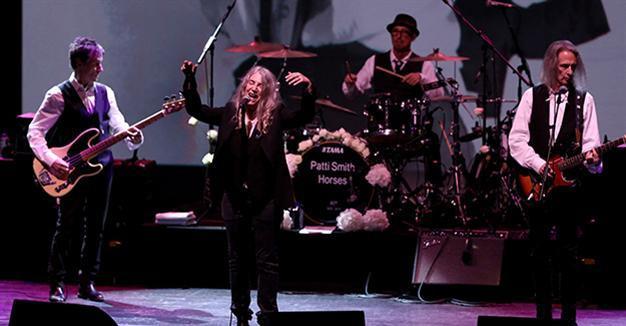Patti Smith's primal scream for people power
MONTREUX - Agence France-Presse

"Use your power!" Patti Smith roars to a cheering crowd, throwing back her long grey hair and thrusting a skinny arm with a clenched fist into the air.
It has been nearly 30 years since Smith released her iconic single "People Have the Power", but as she belts out the lyrics at the Montreux Jazz Festival the words ring with the same righteous fury as in 1988.
"People have the power, the power to dream, to rule, to wrestle the Earth from fools," the nearly 70-year-old Godmother of Punk belts out to the some 4,000 people packed into Montreux's largest concert venue.
Smith has been raging against the system since she burst onto the music scene with her debut album "Horses" in 1975.
Its punk-rock music overlaid with Beat-inspired poetry is still ranked among the greatest albums of all time.
Later came a gem for which Smith is perhaps most famous -- "Because the Night," co-written with Bruce Springsteen, which appeared on her third album "Easter" in 1978.
Wearing dark glasses, her customary black trousers and jacket, and with her long grey hair hanging loose around her shoulders, Smith told AFP before Wednesday's concert that today's world faced huge challenges.
"My concerns are my children, our air, our water, the vast corruption in government and corporations, (and) how media has become so corrupt and journalism has cheapened," she said.
"Just look at what happened with the so-called Brexit," she said, referring to Britain's vote on June 23 to leave the European Union.
"They don't seem to know what they're doing, why they're there, what to do now," she said.
"This instability was brought about largely because of misinformation."
"We are living in a world of misinformation," Smith said, decrying mendacious portrayals of everything from refugees to climate change.
"No one seems to care about facts," she said, insisting that "everyone is concerned about making money, ratings, how many hits they have on Facebook... it is like social media is starting to permeate everything."
"Instead of counting "likes" on Facebook, we should be judging ourselves "by true deeds. What are we actually doing? What are we actually accomplishing?" she said.
Smith's anger is also directed at numerous recent terrorist attacks around the world, and she dedicated the rendition of July 6 of "Beneath the Southern Cross" to the "so many innocent people (who) have died all over the world."
"They are all special people," she shouted. "We mourn them."
While she rages about the world's injustices in her songs, Smith also exudes humility, warmth and generosity.
In the interview she insisted her widely anticipated gig in the evening would simply be a warm-up for British rocker PJ Harvey, who followed on the same stage.
"When I leave I hope the people will be energised and ready for Polly," she said.
And despite her dreary analysis of the state of the world, Smith is optimistic about the future.
"New generations are the hope of the world," she said, pointing out that today's young people have true revolution at their fingertips, thanks to new technologies.
"They have very powerful technology in their hands, they could make great change if they really pursue the highest of efforts and pursuits and desires," she said.
More than any previous generation, the youths of today have "a way to globally unify," she said, voicing hope they "could globally unify towards a peace movement, for the environmental movement."
Smith meanwhile has little sympathy for the struggles of artists and musicians trying to break into her industry today.
"You know. I always believe that artists, they have to fend for themselves. It's not easy. There's a lot of sacrifice," she acknowledged, but stressed: "I don't have any sympathy for that."
"I have sympathy for families walking across hundreds and hundreds of miles with children with no one wanting them, not knowing where to go," she said, referring to the hundreds of thousands of refugees who have tried to make their way through an often-times hostile Europe.
When it comes to struggling musicians, there is only one way to go: "You pick up an electric guitar, find a door and kick it down."
 "Use your power!" Patti Smith roars to a cheering crowd, throwing back her long grey hair and thrusting a skinny arm with a clenched fist into the air.
"Use your power!" Patti Smith roars to a cheering crowd, throwing back her long grey hair and thrusting a skinny arm with a clenched fist into the air.